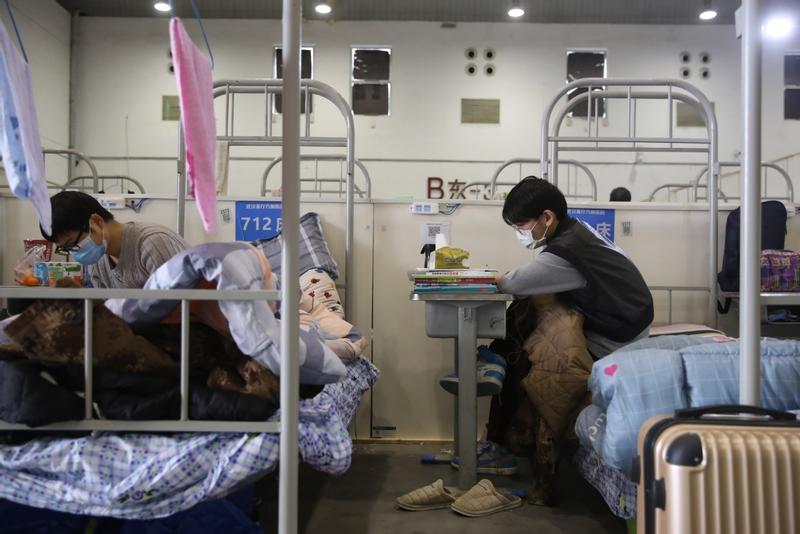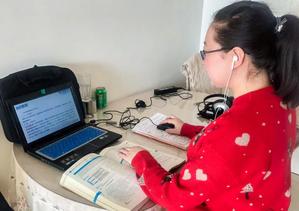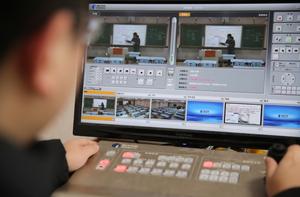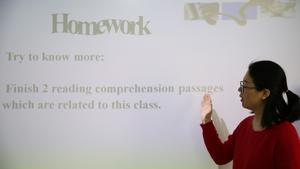As China battles the epidemic, students preparing to take this year's national college entrance exam are finding new ways of studying, revising and expressing themselves. Zhao Yimeng reports from Beijing, with Liu Kun in Wuhan.
 High school senior students study for the national college entrance exam at a makeshift hospital, a temporary infirmary designed to treat people infected with the novel coronavirus, in Wuhan, Hubei province, in February, 2020. (PHOTO PROVIDED TO CHINA DAILY)
High school senior students study for the national college entrance exam at a makeshift hospital, a temporary infirmary designed to treat people infected with the novel coronavirus, in Wuhan, Hubei province, in February, 2020. (PHOTO PROVIDED TO CHINA DAILY)
A rap written by candidates for the gaokao, China's national college entrance exam, has gone viral on social media, garnering thousands of hits and comments on the platform, QQ Music.
Empty City, which makes reference to the novel coronavirus epidemic, was created by a couple of grade three students from the High School Affiliated to Renmin University, also known as RDFZ, a prestigious establishment in Beijing.
The students recorded the song during their preparations for the exam, which will be held in June.
My classmates and I are optimistic about the situation, as too much tension doesn’t help at all
Guan Zian, senior student at Wuhan No 6 High School
Liu Yixin and his classmate Li Yusheng, both 18, wrote the song to express their feelings about the outbreak and to support the families of people infected with the virus.
On Jan 28, Yang Jun, the father of one of their classmates, was the first reported death from the virus in the capital.
Liu and Li responded lyrically:
Lives claimed by the epidemic rest in peace/I can't imagine how tortured her family is.
How many sins in history weren't led by selfishness?
Is it possible to prevent/a daughter facing the gaokao crying in front of her father?
Many people who commented said they had played the song continuously, and they praised the sentiments voiced.
The comments included, "These children shouldered their responsibilities for the nation and they didn't disappoint our expectations," and "Young people are the hope of the country."
Liu wrote the music and sang the song. He has been playing guitar for two years and previously formed a band at the school, but it broke up because the students were so busy with their studies.
"I am addicted to hip-hop music, rock 'n' roll and electronica. My hobby is producing music on my computer after I've done my schoolwork," he said in his introduction on QQ Music.
 A teacher gives an online lecture to senior students from her home in Hohhot, capital of the Inner Mongolia autonomous region, in February, 2020. (DING GENHOU / FOR CHINA DAILY)
A teacher gives an online lecture to senior students from her home in Hohhot, capital of the Inner Mongolia autonomous region, in February, 2020. (DING GENHOU / FOR CHINA DAILY)
He taught himself to make music, using his pocket money to buy materials online to improve his skills.
"I really love music and can't live without it. Like other musicians, I want to express my ideas and opinions," he said, referring to lyrics like those below.
Some people see profits from national disaster/Some people deliver masks regardless of danger.
Some people seeking wild tastes forget the advice of the ancestors/Some people heading up isolation rooms repeat the sincere prayer.
According to Education Community, a column in China Youth Daily, Liu said he felt uncomfortable with some opinions expressed on the internet, such as rumors that hospitals had no facilities to treat those infected with the virus, and the fact that people from Wuhan, Hubei province, the epicenter of the outbreak, faced discrimination.
He responded in the song, which he created in about six hours, spending a whole morning producing the beats. He sent a demo to Li, who wrote most of the words.
"Li made a great contribution to the lyrics and I just polished them. I'm unfamiliar with remixing techniques, so the arrangement was not deft because of my limited time and skills," Liu said.
Initially, he thought the virus was far removed from his daily life.
"But now, it is close. None of us wants to see family members passing away, especially in our gaokao year. Even worse, the comments on social media are depressing and annoying. That's why I decided to make this song," Liu wrote on WeChat.
"I hope the haters will hear my voice."
Li Jingxuan, a third grader at Beijing No 14 High School, echoed Liu's feelings.
"A friend told me that people in their community in Northeast China had attacked cars carrying Hubei license plates," she said.
She added that she saw a comprehensive range of humanity in the epidemic; not only the bright side, like those fighting the virus on the front line, but also the dark side, including fraudsters who are making profits by selling fake face masks.
"The Chinese people are united in favor of some big things," she said, referring to the song's lyrics.
Respect, we are fighting for the same goal/Respect for RDFZ, I call/Respect. Only united can we conquer obstacles.
 A technician monitors a recording being made by a teacher during an online course in Qingdao, Shandong province, in February, 2020. (ZHANG JINGANG / FOR CHINA DAILY)
A technician monitors a recording being made by a teacher during an online course in Qingdao, Shandong province, in February, 2020. (ZHANG JINGANG / FOR CHINA DAILY)
'Touchstone'
Wang Peixian, a gaokao candidate at the Experimental School Affiliated to Haidian Teacher Training College in Beijing, described the virus as a "touchstone".
"It doesn't give people a free ride. All the darkness and egoists have been exposed by the media coverage, while the kindness of medical workers and volunteers is magnified," he wrote in an email to China Daily.
"We may be confused or disappointed, but we are never desperate. Spring always arrives after winter."
While Liu finished his rap song at home and started a second round of revision for the all-important exam, his peers in Wuhan have also been racing against time to prepare for the gaokao against the backdrop of the city's lockdown.
Since early January, Tong Linshu has taken six online classes a day, each lasting an hour. Her active study period stretches from 8 am until 6 pm. At 7 pm, she begins question-and-answer sessions with her teachers.
Tong, who is studying arts-based subjects at Wuhan No 6 High School, didn't feel the online classes had disrupted her gaokao preparations too badly.
"Actually, it's easier to ask questions online because we always get a reply from the teacher the next day, which is more efficient than waiting in line for an answer during breaks at school," she said.
Her main challenge is maintaining self-discipline in light of the flexible timetable and comfortable home environment.
"That has added a lot of pressure," said Tong, who has been staying with her grandparents since Jan 23, when Wuhan's lockdown began. The regulations mean she has not been able to return to her home in the downtown since then.
The 18-year-old had no idea how long the lockdown would last and felt anxious about the epidemic.
"When I didn't know how infectious the virus was, I thought the lockdown was exaggerated. It was hard to believe this unusual event happened to us in Wuhan," she said.
Citing the 2003 outbreak of severe acute respiratory syndrome in Beijing, she said such things happen and "there is always a way to solve the problem".
She was impressed when she learned that a doctor had acted as a barber to cut the hair of female medical workers who were scheduled to travel to Wuhan. The women had decided to have their hair cut to reduce the risk of infection at work and to make it easier to shower frequently.
"But they didn't need to have their heads shaved completely, so the doctor only shortened their long hair to meet their professional needs," Tong said.
She hopes gaokao students will be given a day off when the lockdown is lifted. "The first thing I will do is go to the downtown and buy a cola at the supermarket," she said.
 An English teacher sets homework for her students during an online class in Qingdao in February, 2020. (ZHANG JINGANG / FOR CHINA DAILY)
An English teacher sets homework for her students during an online class in Qingdao in February, 2020. (ZHANG JINGANG / FOR CHINA DAILY)
Her father has tried to comfort her by emphasizing the positive. "He said I will have solved one more problem (beaten the virus) than the other students (previous gaokao candidates)," she said.
If the essay subject in this year's exam is related to the epidemic, Tong may write about the international support shown for Wuhan, along with the supplies that have arrived from across the globe.
"People from different countries and cultures have come together to fight this disaster," she said.
Tong wants to study law at Wuhan University. "Figuring out the legal system will help me form a deeper understanding of the country via a range of rational and diverse opinions," she said.
"You have to make all-out efforts to be the best in any field."
Optimism
Guan Zian, who also attends Wuhan No 6 High School, said the epidemic means the pressure of the once-in-a-lifetime exam has been eased.
"Everyone has been affected by the outbreak to some degree. My classmates and I are optimistic about the situation, as too much tension doesn't help at all," the 18-year-old said.
He and his friends have discussed the possibility that the exam may be postponed.
"There has been no confirmation of that, so we will continue to study according to our original schedule," he said, adding that he hopes the exam will proceed as planned.
Zhang Junchun, director of the third grade at Wuhan No 6 High School, said the grade consists of 16 classes of about 40 students each.
"Four psychological counselors have published blogs offering advice for the students, who can call them during work hours," he said.
He added that all the teachers, especially class heads, have been encouraged to provide students with advice during online classes, because "their familiarity with the students' backgrounds will help the candidates regain their confidence and a normal attitude".
Most of the students remain optimistic, according to Zhang. "They are still young and their sources of information are relatively limited, thanks to the protection offered by their schools and families," he said.
Contact the writers at zhaoyimeng@chinadaily.com.cn


